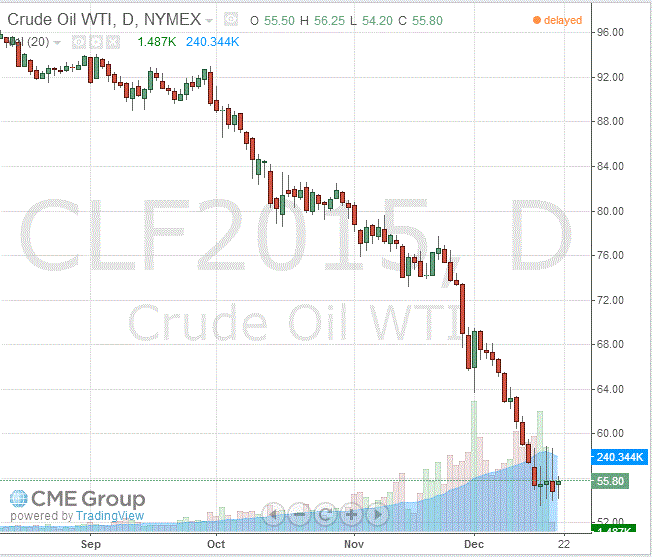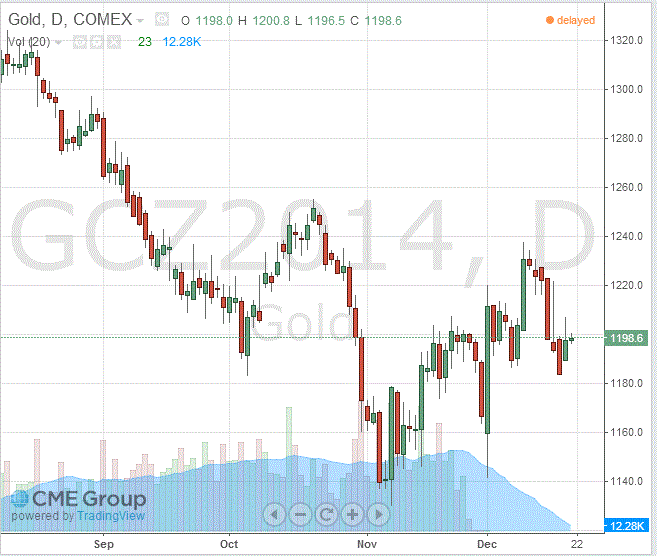Notícias do Mercado
-
16:40
Oil: a review of the market situation
Oil prices rose moderately, rising above $ 60 per barrel (Brent), and depart from the 5.5-year low, as investors try to balance position by the end of the year after a six-month decline in prices.
But despite the rise in price of oil is now on the way to his fourth consecutive weekly decline, due to OPEC's decision to abandon production cuts, despite the huge global reserves. Prices for Brent and WTI fell almost doubled since June, and many investors expect further fall if production decreases or the demand will not grow.
"After a long and a sharp drop in oil prices in recent days, there has been interest in buying, but selling pressure is maintained," - said the expert Newedge Japan Ken Hasegawa. Many oil companies have announced plans to cut costs in the coming year, as lower oil prices made some projects uneconomical. "But at the moment there is no significant production decline, and the balance of supply and demand does not change, so that prices may fall further," - said Hasegawa.
Little influenced by data from the American Petroleum Institute (API), which showed that oil production in the US for the first time in 28 years last month exceeded 9 million barrels per day. US rocked in November 9.06 million barrels of oil per day - 15% more than last year, and a daily maximum value in March 1986. For November, the highest rate since 1973. The growth of oil production in the United States contributed shale boom. US refineries processed a record 16.3 million for November. Barrels per day. Gasoline production increased by 0.6% to a record 9.54 million for November. Bpd.
Meanwhile, earlier today, Iraqi MP Haitham al-Dzhiburi said that Iraq will stop new investments in oil projects if oil prices fall to $ 50 per barrel. Iraq's draft budget for 2015 based on an average oil price of $ 70 per barrel.
Cost of January futures for US light crude oil WTI (Light Sweet Crude Oil) rose to 55.80 dollars per barrel on the New York Mercantile Exchange.
January futures price for North Sea petroleum mix of Brent rose $ 0.74 to $ 60.55 a barrel on the London Stock Exchange ICE Futures Europe.
-
16:20
Gold: a review of the market situation
The value of gold has hardly changed today, stabilized slightly below the level of $ 1,200, which is associated with the strengthening of the US dollar and expectations of higher interest rates in the United States. Recall, on Wednesday the Fed has indicated that it may raise interest rates next year, replacing the intention to keep them close to zero level "extended period" of time for a promise to show "patience" before making a decision to raise the cost of borrowing.
Gold, which does not bring interest income, it is possible hardly compete with other assets yielding interest, when interest rates rise. In addition, higher interest rates are likely to have support for the US dollar, which also have a negative impact on the situation of dollar-denominated metal.
"The market is now seeking to move away from the $ 1,200. The positions are evenly distributed, so the further it will set the direction of the news in early January," - said the expert Saxo Bank Ole Hansen.
Meanwhile, Commerzbank analyst Carsten Fritsch said: "it was surprising that gold has not dropped after the Fed meeting, given the strength of the dollar. We expect that the price of the precious metal will be under some pressure in the first half of the year, and perhaps will drop to about $ 1,100 per ounce in the second quarter due to the impact of higher interest rates, falling inflation expectations, lower oil prices and economic weakness outside the US. "
It is worth emphasizing, the dollar rose 0.4 percent compared with a basket of major currencies, while the yen fell on expectations of further stimulus next year to support the Japanese inflation.
Market participants are also monitoring the situation in the physical gold market. Importers in India for the first time in five months, offering gold at a discount to the price of $ 2 in London, indicating that excess metal on the market. Experts note that the demand in India is likely to fall significantly in December after the rapid supply growth in the previous three months.
Little impact also continues to yesterday's unexpected decision of the central bank of Switzerland set a negative rate next year. Swiss National Bank announced that, starting from 22 January 2015, the interest rate on deposits "overnight" will be 0.25%. This measure is aimed at weakening the Swiss franc and prevent deflation. Negative interest rates are likely to make Swiss investors move from cash to gold.
The cost of the December gold futures on the COMEX today rose by $ 3.0 to 1196.60 dollars per ounce.
-
11:25
Oil: Brent holds below USD60
Brent crude and West Texas Intermediate are trading higher today after volatile trading on Thursday. Recent sell offs to five-year lows were judged excessive by market participants. Yesterday Saudi Arabia's oil minister reiterated that it would be difficult for Saudi Arabia and the OPEC alone to reduce the volume of production and added that the market is experiencing temporary difficulties, mainly due to the weakening global economy. U.S. oil producers continue to produce on record levels fighting for market shares.
Brent Crude added +1.16%, currently trading at USD59.96 a barrel. Crude hit a low at USD58.50 this week. West Texas Intermediate rose +1.33% currently quoted at USD54.83.
-
11:00
Gold trading little changed below USD1,200
Gold prices trade steady around USD1200 after the FED statement being "patient" with rising rates and the positive outlook on the U.S. economy. A broadly stronger U.S. dollar after better-than-expected data on Initial jobless Claims and low oil prices weigh on gold. Rallying stock markets put further pressure on the metal.The precious metal is currently quoted at USD1,197.40 or -0,02% a troy ounce.
GOLD currently trading at USD1,197.40
-
09:18
Press Review: Ruble firms as government steps up verbal support
REUTERS
Ruble firms as government steps up verbal support(Reuters) - Russia's ruble strengthened on Friday after Finance Minister Anton Siluanov confirmed his ministry had sold foreign currency and on expectations that exporters will step up dollar sales.
At 0815 GMT (03:15 a.m. EST), the ruble was around 2.7 percent stronger against the dollar at 59.85 RUBUTSTN=MCX and gained 2.7 percent to trade at 73.65 versus the euro EURRUBTN=MCX.
The ruble's recovery is in contrast to intense selling pressure earlier this week, when the ruble at one stage had fallen about 20 percent against the dollar on the day before rising again, threatening the relative financial stability on which President Vladimir Putin has built his popularity.
Source: http://www.reuters.com/article/2014/12/19/us-russia-crisis-markets-idUSKBN0JX0OS20141219
Businessweek
The Relentless Production of Shale Oil Is Breaking OPEC's Neck
The world's biggest oil companies faced ruin in the summer of 1931. Crude prices had plummeted. Wildcatters were selling oil from the bonanza East Texas field for a nickel a barrel, cheaper than a bowl of chili. On Aug. 17, Governor Ross Sterling declared a state of insurrection in four counties and sent 1,100 National Guard troops to shut down the fields and bring order to the market. A month later the Railroad Commission of Texas handed out strict production quotas.
BLOOMBERG
Yellen's Inflation Lessons: Targets Matter, Oil Shocks Dissipate
Janet Yellen isn't likely to change monetary policy because of transitory influences on prices coming from abroad. She's also not inclined to tolerate a long period of above-target inflation as a way of making up for years of little change in living costs.
Those are among the insights the Fed chair offered investors at her press conference this week.
For Yellen, these issues are now critical. Inflation has been below the Fed's 2 percent target for 30 months and, with a 45 percent decline in oil prices this year, will remain below it for several more months. Fed officials are wary of inflation remaining too low because it can become a drag on growth.
BLOOMBERG
Russia Forcing SNB Hand Drains Arsenal to Fight ECB StimulusJanet
The Swiss National Bank's resort to negative interest rates leaves President Thomas Jordan wielding a weaker hand when the European Central Bank ramps up stimulus.
Swiss central bank officials are now bracing for a month of currency speculation as the Russian crisis simmers on and a potential ECB quantitative easing decision on Jan. 22 threatens further pressure on the franc. While the SNB can toughen its response, any further action will probably lack the shock factor unleashed with yesterday's deployment of a charge on deposits.
-


